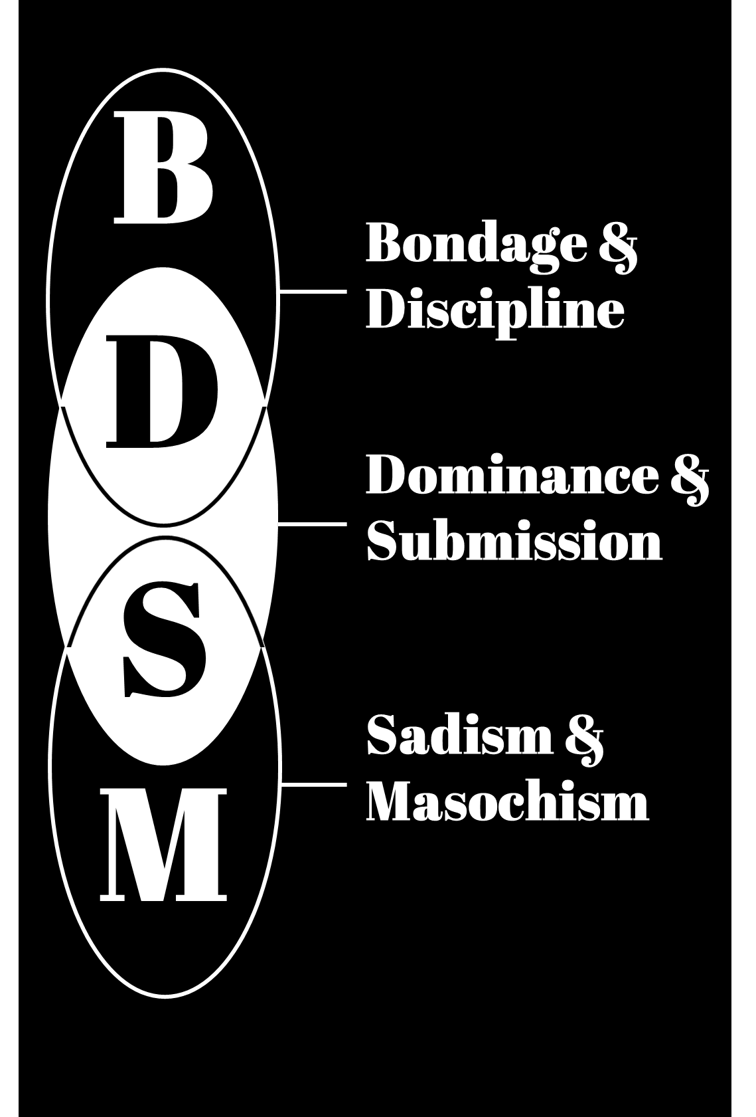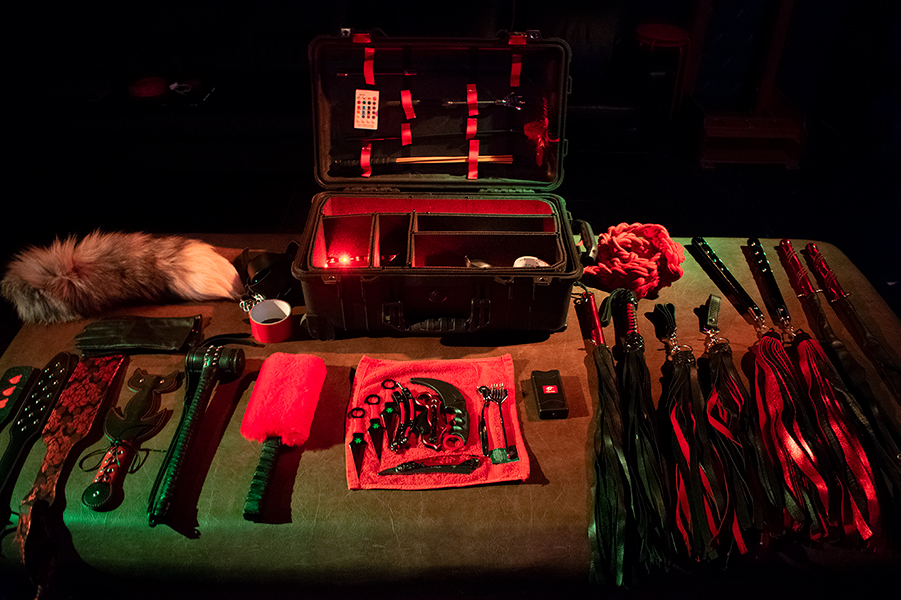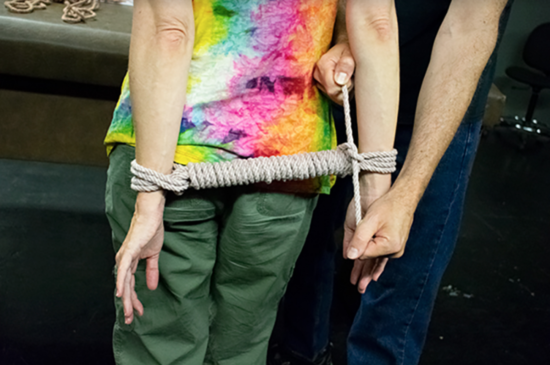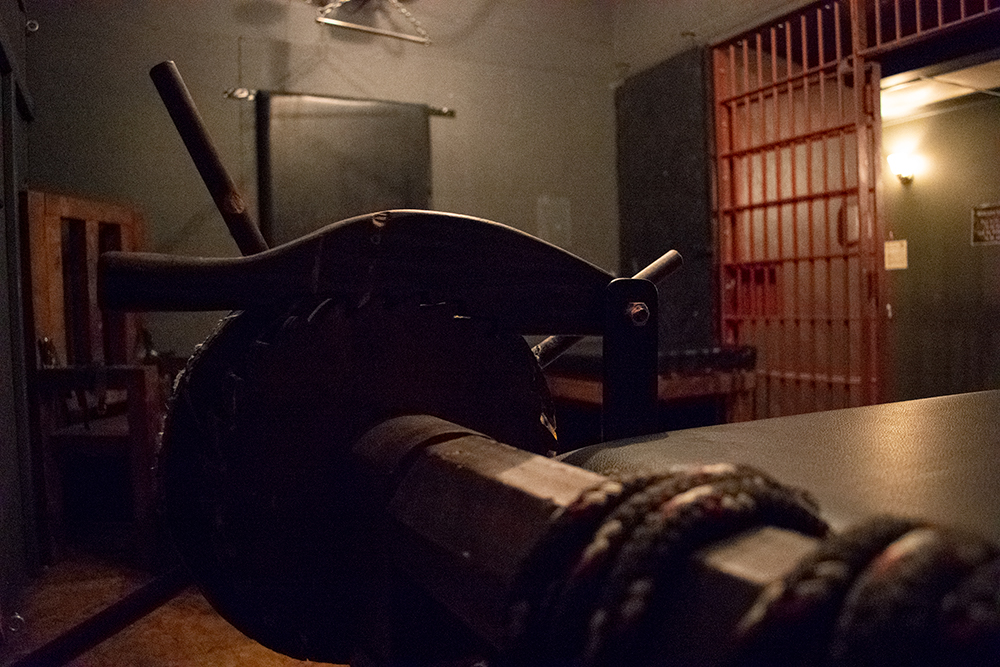Healthier than vanilla?
The mainstream world may have a few things to learn from BDSM culture
[ezcol_1half]

[/ezcol_1half]
[ezcol_1half_end]

[/ezcol_1half_end]
A clinical psychologist and mother of two, who we’ll call Vivienne*, sits patiently on the black leather couch. Red light washes down over her Venetian carnival mask. She speaks with a soft, measured cadence reminiscent of a parent explaining something to a young child.
“I have to be so in-control in my everyday life,” she says. “It feels good to just let that all go.”
Tonight, Vivienne is going to get tied-up, blindfolded, spanked and tickled. Perhaps there will be a few onlookers.
She’s looking forward to getting into her “subspace,” a euphoric state that submissive partners in a BDSM exchange can enter, brought on by an influx of endorphins, adrenaline and other neurochemicals. “It’s like meditation,” she explains. “Everything in the world is just closed out and all you can think about are the sensations happening to you.”
Vivienne is about to enter the main dungeon floor of the Threshold Society, a Los Angeles-based nonprofit kink community. The facility is tucked away behind an unmarked door in a maze of industrial spaces in North Hollywood, surrounded by shipping warehouses, storage units and auto repair shops.
She’ll join other BDSM fans of all stripes, from curious first-timers to veteran practitioners at tonight’s party. Many will come with partners, bags of toys and a clear plan for the evening. Some, like Vivienne, will come looking for a companion. Others will come simply to watch and learn.
And there is a lot to learn.

Despite frequent and inaccurate media portrayals as dangerous, coercive or abusive, BDSM is founded in a strict system of consent and safety-conscious practices. Newcomers are expected to familiarize themselves with proper techniques before engaging in potentially risky activities, often through classes and workshops such as those regularly hosted at Threshold. There are no doors on the L.A. space’s numerous playrooms, allowing effective oversight and monitoring of all activity.
As in most BDSM dungeons, designated experienced community members, known as “dungeon monitors,” patrol the halls at Threshold’s parties watching for any signs of problematic behavior. A lengthy negotiation takes place between potential partners in any role play.
“There is nothing without consent,” explains Miguel Davila, a member of Threshold’s board of directors. “There’s no interaction, there’s no play, there’s no [BDSM] scene, there’s not even any touching without consent.”
The consent negotiation process for a BDSM interaction is far more elaborate than “vanilla,” or non-kinky, sexual encounters. Participants discuss and agree on every aspect of the proposed roleplay, including what activities someone is interested in, where they may and may not to be touched, what toys they would like to be used, triggers, medical conditions, safe words and after-care preferences.
[ezcol_1half]

[/ezcol_1half]
[ezcol_1half_end]

[/ezcol_1half_end]
Dr. Ellen Lee of The Science of BDSM, an academic research group, says that the benefits of this focus on discussion go beyond creating a safe and enjoyable BDSM experience. They can also improve a person’s overall communication skills and emotional self-awareness.
“If someone is engaging in something that is potentially physically risky, there is a strong need for that person to able to engage in self-reflection and then communicate,” says Lee. “It’s not just, ‘I can tell you how I’m feeling,’ but also that, ‘I really know how I’m feeling.’ Social-psychology tells us that that we are not always good at identifying what we are feeling and why.”
According to Lee, and many members of the BDSM community, this level of mandated communication and introspection is not something most people get in their everyday lives.
“Unfortunately, in the mainstream world, people don’t talk as much,” says Miguel Davila. “That’s what a lot of people like about the community. It’s about communication and self-improvement all the time, being accountable for your actions and being responsible for what you do with the other person.”
This emphasis on consent, communication and accountability means that BDSM dungeons are often safer spaces than a local bar or a school dance, according to Emily Prior, executive of the Center for Positive Sexuality.
“You have people in these spaces saying, ‘We’re gonna sit and talk before we do something, see where we each are, see how things might line up, see what you are in the mood for today, and then we might proceed,'” says Prior. “Whereas in mainstream culture it’s often ‘well, if they don’t say no fast enough, then we’re just gonna assume that everything is fine.'”
Prior, who also teaches classes at several L.A.-area schools, says that she often asks her students to imagine how things would play out if they discussed their sexual expectations when hitting on someone at a bar.
“They freak out and say, ‘oh no, I couldn’t have that conversation,'” says Prior. “And I say, ‘if you can’t have that conversation, then you’re not ready to do it.'”
[ezcol_1half]

[/ezcol_1half]
[ezcol_1half_end]

[/ezcol_1half_end]
These discussions are particularly salient in the age of #MeToo. While high-profile instances of systematized sexual aggression have driven discourse on consent into the mainstream, these conversations have been a fundamental part of the BDSM community since its inception. In this regard, the vanilla world may have something to learn from kink culture.
Research by Lee and her team suggests that participation in a culture of consent through BDSM play is associated with lower rape-supportive beliefs. In a survey of BDSM community members, college students and adults from the general population, BDSM practitioners scored significantly lower than other groups on measures of benevolent sexism, rape myth acceptance and victim blaming.
While Lee notes that further studies are needed, the data suggests that members of the BDSM community tend to have healthier attitudes toward consent and female sexual agency than their mainstream counterparts.

Count Boogie (his legal name) is the facility manager, media relations lead and self-described janitor at Threshold. He says that the #MeToo discussions highlight a sad irony in public perceptions of the BDSM community.
“We’re the ‘depraved perverts,’ we’re the ‘scourges of society,’ and yet we seem to be pretty good on consent in general,” says Boogie.
His comments reflect a troubling reality for many BDSM practitioners. Although attitudes have improved somewhat in recent years, people involved with BDSM and kink are still frequent targets of discrimination.

“Most people in this life are not ‘out.’ They can’t be,” says Boogie. “People are still getting fired from their jobs, they’re losing their kids in custody battles, their families are trying to have them institutionalized or disinherit them. There’s still so much stigma around this activity.”
Although quantitative studies of discrimination against the BDSM community are rare, a 2008 survey by the National Coalition for Sexual Freedom (NCSF) highlighted how pervasive the issue is. Nearly 40 percent of the over 3,000 respondents reported experiencing harassment, discrimination or violence aimed at either themselves or their kink-related business. Of those specifying personal descrimination, 1 in 5 reported losing a job or contract. Six percent reported losing custody of their children.
This type of discrimination is why many, such as Vivienne, cannot afford to be “out,” or open about their involvement with the BDSM community.
“I’ve got two children,” says Vivienne. “Not that my kink has anything to do with children, of course, but people judge.”
Vivienne is now divorced. She says “coming out” to her husband about her BDSM preferences drove a wedge between them that eventually led to the end of their marriage.
“He said it was sick — that I should get [professional] help,” she recalls with a sad smile.
Vivienne’s ex-husband was a traditionalist and uncomfortable with her interest in kink culture. According to Emily Prior, allegations that BDSM is unhealthy do not, however, come only from social conservatives. Prior, who has been involved in BDSM research for more than two decades, says that women, particularly submissive women, are sometimes seen as conforming to negative gender stereotypes.
“When I first started studying this, a lot of the research literature said that the women who do this [BDSM] are acting out a patriarchal, submissive-woman paradigm,” says Prior. “[It said] that they shouldn’t doing this and that they’re only doing it because the patriarchy tells them that it’s their role.”
Both Prior and Lee say, however, that such concerns are misguided.
“Women in the BDSM community are being empowered to dress however they want, to ask for their sexual desires to be fulfilled and not get that negative shame that you get in the general public,” says Lee. “To me, as someone who identifies as a feminist and someone who is very sex-positive, it’s very empowering for women.”
Lee also notes that her team’s research shows that women participating in the BDSM community report lower levels of victim-blaming and rape myth acceptance than the general population. It suggests that the greater sexual agency in kink-culture makes women feel more empowered, regardless of their role in a BDSM exchange.
“This is telling women that you can own your sexual desires,” explains Lee, “you can go get them, you can enjoy them, you can be satisfied with them and however much you want, go for it.”
Vivienne, who identifies as a submissive, agrees that becoming involved with BDSM has been an empowering experience. She says that the ability to openly discuss expectations, set boundaries and revoke consent at any time are a far cry from the sexual script of most mainstream relationships.
“People think that you’re just a doormat if you’re submissive in BDSM, but I’ve never had more control in a relationship,” she says. “I was a doormat when I was with my husband.”
Notes:
*Vivienne’s name has been changed to protect her identity
All photos and graphics by James Cutchin